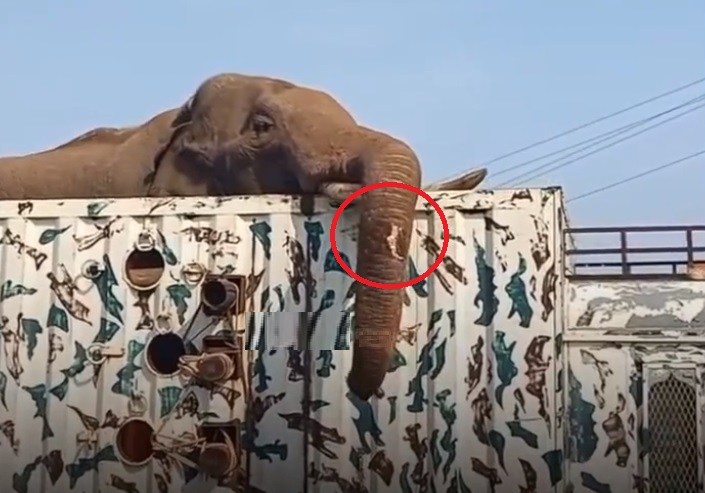Arikomban is in great shape, and is trying to integrate with other herds of elephants, the state Forest Department said.

Injury seen on the trunk of Arikomban as he was transported from Theni after his second capture. (Supplied)
His legion of fans in Kerala can heave a sigh of collective relief.
The wounds of the rice-loving tusker Arikomban appear to be healing — and efforts are on to make him join an elephant herd in his new home in the forests of the Kalakad Mundanthurai Tiger Reserve (KMTR) in the Upper Kodayar area in Kanniyakumari district, where he was released on 6 June after being tranquillised and captured in Theni.

Arikomban on the banks of Kothai river after his second translocation to KMTR. (Supplied)
“Maximum efforts (are being put in) to get Arikomban to join a nearby elephant herd, but the elephant is quite ambivalent, the Tamil Nadu Forest Department said in a release.
The press statement added that the Forest Department officials have been “very assiduous when it came to the acclimatisation of the elephant in the KMTR”, and have been constantly monitoring the activities and health of Arikomban since its release three weeks back..
“The once-bewildered and inveterate crop-raiding elephant has transformed into an independent elephant, which in the past few weeks has shown remarkable results,” the release on Sunday, 25 June, said.
“Overall, the elephant is healthy, in great shape, and trying to integrate with the other herds of elephants as per the daily monitoring by frontline staff from ground zero in Upper Kodayar,” it added.
Arikomban — a portmanteau of the Malayalam words ari, meaning rice, and komban, meaning tusker — was a native of the Chinnakanal area of the Munnar district in Kerala, where he displayed a penchant for raiding ration and grocery shops to gorge on his favourite rice and jaggery.
Fed up with the about 35-year-old pachyderm’s incursions into their hamlets, the locals mounted protests to force his capture and relocation to a different place. The protests were countered by animal rights activists who advocated against moving Arikomban from his habitat.
The matter got tangled in a legal case that went from the lower courts right up to the Supreme Court, which stood by a Kerala High Court ruling that, on the advice of an expert committee it had appointed, said Arikomban should be translocated to some other forest area.
Following the Supreme Court ruling, the Kerala Forest Department mounted an operation that led to the capture of the tusker on 29 April, and its relocation to the state’s Periyar Tiger Reserve (PTR) — some 105 km from his home and herd.
Arikomban, now collared with a GPS tracker, made an appearance on the outskirts of Theni district’s Cumbum taluk in Tamil Nadu on 26 May. This sparked fevered speculation in Kerala that the animal was making an effort to return to his home in Munnar.
But that was not the case. Arikomban did not cross into the Mathikettan Shola national park in Kerala’s Idukki district, as was widely anticipated.
A team of five veterinarians under Dr Kalaivanan was deputed to monitor the tusker’s health. Further, 23 elephant trackers were deployed to monitor its movements.
On 28 May, Arikomban moved to the Koothanachi reserve forest, and the forest officials prevented the elephant from entering a human habitat.
However, the next day, it entered Cumbum town. A 56-year-old man, Balraj, who fell from his two-wheeler while fleeing the elephant, suffered head injuries. He died on 30 May.
Even before Balraj’s death, which sparked anger, the Tamil Nadu Forest Department had launched an operation to capture and translocate Arikomban on 27 May.
On 5 June, officials of the department finally managed to tranquilise Arikomban when the animal strayed into a village.
It ran some 100m after being hit by the first dart and slowly went into sedation. Forest officials bound its legs, brought in three kumki — or trained — elephants, and ferried it out of the village.
After he was tranquilised with two darts and captured, a team of Forest Department officials and veterinarians provided him some initial treatment. He was then put a specially-designed ambulance with the help of the kumkis and travelled about 300 km from the hilly Theni district, where he was captured.
En route on his journey through Madurai and Tirunelveli districts, he was given a shower to keep him cool in the sweltering summer.
He was released the next day into the KMTR, which is spread across Tirunelveli and Kanyakumari districts of Tamil Nadu and borders Kerala.
“He has been left in the deep forest close to a water body with good fodder availability. Let’s hope he will not stray into habitation again,” the Forest Department said soon after he was released.
Fortunately, the pachyderm now seems to have settled into his new home.
(With PTI inputs)

May 18, 2024

May 18, 2024

May 18, 2024

May 18, 2024

May 18, 2024

May 18, 2024